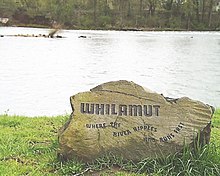
Eugene is a city in and the county seat of Lane County, Oregon, United States. It is located at the southern end of the Willamette Valley, near the confluence of the McKenzie and Willamette rivers, about 50 miles (80 km) east of the Oregon Coast.

The Nobel Prizes are five separate prizes awarded to those who, during the preceding year, have conferred the greatest benefit to humankind, as established by the 1895 will of Swedish chemist, engineer, and industrialist Alfred Nobel, in the year before he died. Prizes were first awarded in 1901 by the Nobel Foundation. Nobel's will indicated that the awards should be granted in the fields of Physics, Chemistry, Physiology or Medicine, Literature, and Peace. A sixth prize for Economic Sciences, endowed by Sweden's central bank, Sveriges Riksbank, and first presented in 1969, is also frequently included, as it is also administered by the Nobel Foundation. The Nobel Prizes are widely regarded as the most prestigious awards available in their respective fields.

The Nobel Prize in Physics is an annual award given by the Royal Swedish Academy of Sciences for those who have made the most outstanding contributions to mankind in the field of physics. It is one of the five Nobel Prizes established by the will of Alfred Nobel in 1895 and awarded since 1901, the others being the Nobel Prize in Chemistry, Nobel Prize in Literature, Nobel Peace Prize, and Nobel Prize in Physiology or Medicine. Physics is traditionally the first award presented in the Nobel Prize ceremony.

The Willamette River is a major tributary of the Columbia River, accounting for 12 to 15 percent of the Columbia's flow. The Willamette's main stem is 187 miles (301 km) long, lying entirely in northwestern Oregon in the United States. Flowing northward between the Oregon Coast Range and the Cascade Range, the river and its tributaries form the Willamette Valley, a basin that contains two-thirds of Oregon's population, including the state capital, Salem, and the state's largest city, Portland, which surrounds the Willamette's mouth at the Columbia.
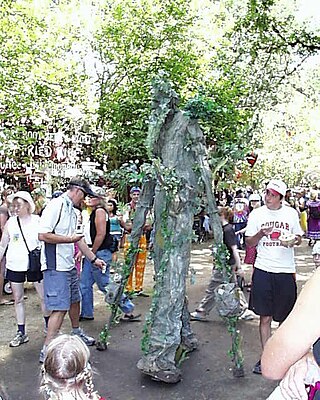
The Oregon Country Fair (OCF) is a nonprofit organization and an annual three-day art and music fair held outside the city limits of Veneta, Oregon, United States. Located in the Willamette Valley, the site is about 13 miles (21 km) west of Eugene along the Long Tom River near the unincorporated community of Elmira. Annual attendance is approximately 35,000, and the fair has around 960 craft and food booths each year. The event is known as an outgrowth of the counter-culture movement and for using environmentally-friendly practices during the fair.

The Gandhi Peace Award is an award and cash prize presented annually since 1960 by Promoting Enduring Peace to individuals for "contributions made in the promotion of international peace and good will." It is named in honor of Mohandas Karamchand Gandhi, but has no personal connection to Mohandas Gandhi or his family.
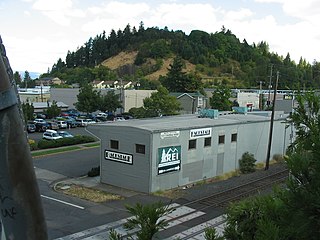
Skinner Butte is a prominent hill on the north edge of downtown Eugene, Oregon, near the Willamette River. A local landmark, it honors city founder Eugene Skinner and is the site of the municipal Skinner Butte Park. During the 1920s the letters "KKK" were burned into the hillside. A famous photo of Eugene's downtown displays this marker, which is credited to Eugene's own Ku Klux Klan members. The letters were removed and replaced with the letter "O" in the late 1920s. The butte later displayed a controversial cross or war memorial, depending on interpretation. The cross was replaced several times, but wasn't permanently removed until 1997. One of the objections to the cross was its perceived association with Ku Klux Klan
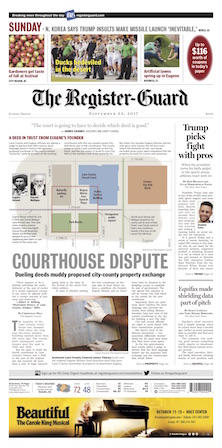
The Register-Guard is a daily newspaper in the northwestern United States, published in Eugene, Oregon. It was formed in a 1930 merger of two Eugene papers, the Eugene Daily Guard and the Morning Register. The paper serves the Eugene-Springfield area, as well as the Oregon Coast, Umpqua River valley, and surrounding areas. As of 2019, it had a supposed circulation of 18,886 daily.

The Hult Center for the Performing Arts is a performing arts venue in Eugene, Oregon.

Pre's Trail, located on the north side of the Willamette River in Eugene, Oregon, United States, popularly referred to as "Track Town USA", is a four-mile-long running and walking trail named after heralded University of Oregon athlete Steve Prefontaine. The woodchip-and-bark trail features riparian scenery, including grasslands, duck ponds, and woods, as well as guide signs with trail maps at each of three primary trailheads. Near downtown Eugene, in Alton Baker Park, Pre's Trail is part of an extensive network of running trails in and around the university town and neighboring Springfield.
The Eugene Symphony is an American orchestra based in Eugene, Oregon. The Eugene Symphony is a resident company of the Hult Center for the Performing Arts and performs in the center's Silva Hall in downtown Eugene and Cuthbert Amphitheater located near Alton Baker Park. Approximately 27,000 people attend Eugene Symphony's classical and pops concert performances each year.
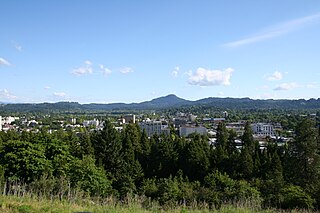
Spencer Butte is a prominent landmark in Lane County, Oregon, United States, described in the National Geodetic Survey as "a prominent timbered butte with a bare rocky summit" on the southern edge of Eugene, with an elevation of 2,058 feet (627 m). Spencer Butte is accessible from Spencer Butte Park and has several hiking trails to the summit. The tree cover on the butte is predominantly Douglas fir; however, the butte is treeless at its summit. The butte is the tallest point visible when looking south from downtown Eugene.

Elijah Bristow State Park is a state park in the U.S. state of Oregon, administered by the Oregon Parks and Recreation Department. It has more than 10 miles (16 km) of well-maintained trails along ponds, wetlands, meadows, and the Middle Fork Willamette River, and through forests of broadleaf and evergreen trees. The trails are open to horses, hikers, and mountain bikers, and there is a separate equestrian staging area popular with riding clubs.

The Nobel Prize in Chemistry is awarded annually by the Royal Swedish Academy of Sciences to scientists in the various fields of chemistry. It is one of the five Nobel Prizes established by the will of Alfred Nobel in 1895, awarded for outstanding contributions in chemistry, physics, literature, peace, and physiology or medicine. This award is administered by the Nobel Foundation, and awarded by the Royal Swedish Academy of Sciences on proposal of the Nobel Committee for Chemistry which consists of five members elected by the Academy. The award is presented in Stockholm at an annual ceremony on 10 December, the anniversary of Nobel's death.

The Nobel Peace Prize is one of the five Nobel Prizes established by the will of Swedish industrialist, inventor, and armaments manufacturer Alfred Nobel, along with the prizes in Chemistry, Physics, Physiology or Medicine, and Literature. Since March 1901, it has been awarded annually to people who have "done the most or the best work for fraternity between nations, for the abolition or reduction of standing armies and for the holding and promotion of peace congresses." The Oxford Dictionary of Contemporary History describes it as "the most prestigious prize in the world."
Willamalane Park and Recreation District maintains and operates five recreation facilities and 46 parks and natural areas, totaling more than 1,500 acres. Highlights include 10 waterfront areas, 29 miles of hiking and biking trails, 9 sports fields and 27 playgrounds. Willamalane offers hundreds of recreation programs to more than 60,000 patrons. Created by voters in 1944, Willamalane is a special tax district, separate from the city of Springfield, Oregon, with its own boundaries. It is governed by a five-member, elected board of directors and managed by a district superintendent. Willamalane offers:
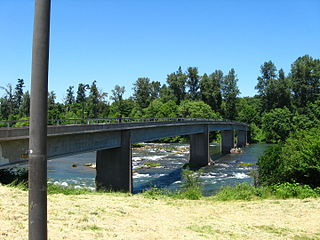
The Dave and Lynn Frohnmayer Pedestrian and Bicycle Bridge, formerly and still informally known as the Autzen Footbridge, is a bicycle and pedestrian bridge across the Willamette River, located in Eugene, Oregon, in the United States. Named after former University of Oregon president David B. Frohnmayer, the bridge connects Alton Baker Park and Autzen Stadium.

Frederick Alexander Cuthbert was an American landscape architect who worked primarily in the U.S. state of Oregon.


